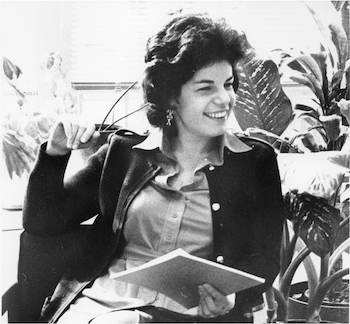
Susan Stamberg was born September 7th, 1938, in Newark, New Jersey and grew up in the Upper West Side of Manhattan as an only child. Her parents, Anne and Robert Rosenberg Levitt, were second-generation Americans of Lithuanian Jewish descent. Nonetheless, her family did not actively practice the Jewish religion, but Jewish values made a significant impact on Stamberg’s upbringing, individuality, and career. Furthermore, her beliefs shaped how she viewed religion as a whole, her value of books, learning, and how she would later choose to raise her own family.
Growing up, Stamberg attended a Jewish primary school to develop her understanding of the religion in preparation for her religious confirmation. However, she was expelled due to her aversion to studying for the confirmation and her favoring of academic subjects. She described herself as Jewish sociologically but was interested in finding her own distinction and autonomy within religion.
Stamberg recalls enjoying the radio from a young age. So much so, that she would look forward to catching a cold so she could stay home and listen to radio soap operas on the Emerson Bakelite Radio with her mother. Moreover, an infamous Stamberg anecdote recounts that a friend of hers did not enjoy staying over at her house because she would keep them up all night with questions. Therefore, Stamberg believes this habit was a foreshadowing of her professional strengths. Evidently, Stamberg’s early exposure to radio and love of profound discussions would manifest into stardom later in her life.
The arts were a significant part of Stamberg’s life from an early age since she valued poetry, visual arts, and music. For this reason, she attended the rigorous Fiorello H. LaGuardia New York’s High School of Music and Art for secondary education. This public performing arts school is located on the Upper West Side of Manhattan, New York, the same area where Stamberg was brought up. The institution was extremely prestigious, and it was laborious to gain admission through application. Many alumni have gone on to have extremely triumphant careers, such as actor Billy D. Williams, lyricist Ed Kelban, and actor Timothee Chalament.
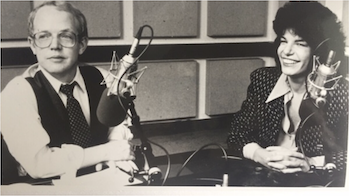
Stamberg was a first-generation college student. She attended Barnard College in New York City and earned a bachelor’s degree in English in 1959. Later in her career, she would go on to earn a Doctor of Humane Letters, an honorary degree, from Dartmouth College. Stamberg also became a fellow of Silliman College, Yale University, and the Academy of Arts and Sciences and served on boards of the PEN Faulkner Fiction Award Foundation and National Arts Journalism Program at Columbia University Graduate School of Journalism.
Straight after college in 1959, Stamberg worked on the journal of the American Academy of Arts and Sciences, called Daedalus, in Cambridge, Massachusetts. In 1962, she married Louis C. Stamberg, and the couple moved to Washington, D.C.. Her husband was a graduate of Harvard Law School and was pursuing a career in the U.S. Agency for International Development (USAID). However, Stamberg put her professional goals on pause in order to be with her husband on a two-year USAID mission in India.
In 1963, Stamberg returned to Washington and learned radio as a producer for a student-run public broadcasting station at American University, WAMU-FM, and would work up to become the general manager. With WAMU-FM, she expressed her love of jazz by playing piano on a segment called “Sue’s Blues.” That way, Stamberg outgrew this job and decided to move on to a new opportunity.
Stamberg gave birth to her first and only child, Josh, in 1970. Louis’s family was devoutly Jewish, and he was set on raising his son similarly to his own upbringing. Thus, Josh would grow up to be an actor, writer, and producer. Some of his most notable projects are “Drop Dead Diva,” “Parenthood,” and “WandaVision.” After the birth of Josh, Stamberg worked at New Republic magazine as a secretary.
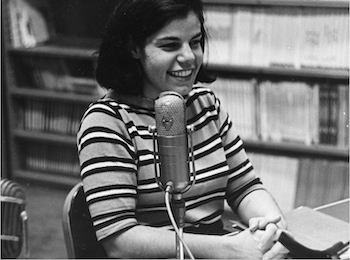
In 1971, Stamberg began her work with National Public Radio (NPR). Based in Washington, D.C., NPR is a public broadcasting organization that specializes in community-based, independent journalism. NPR’s visonsary Bill Siemering wanted the network to be objective, meet the needs of listeners, and sound like real people. NPR also needed to discuss both the disasters and wonders of the world and “celebrate life” as stated in the original mission statement. For this reason, Siemering felt Stamberg would be a perfect part of the team.
For 14 years, Stamberg was a co-host of NPR’s newsmagazine “All Things Considered.” From 1972 to 1986, Stamberg worked on the network’s first broadcast with co-host Noah Adams. The show covers current events and provides commentary on the biggest stories of the present day. During the 1970’s, it included issues and events like the Vietnam War, Watergate, inflation, and much more. With her involvement, Stamberg was the first woman to anchor a national nightly news program.
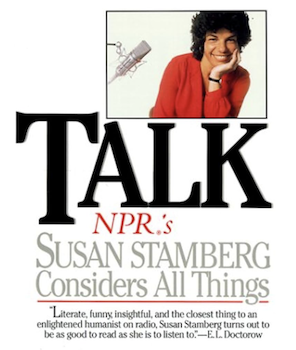
However, the initial reactions to her voice on air were not all positive. Many individuals believed that a woman’s voice could not be “authoritative” enough to convey news in a compelling way. Thus, Stamberg tried to cater her voice to fit the traditional mold of reporting by making herself sound more masculine and authoritative. But later, she opted to embrace her seemingly unconventional reporting voice. Siemering, the creator of “All Things Considered,” believed that her voice was a perfect fit for the network, and he described it as “rich in tone [and] color.” Another quality of Stamberg that makes her a fantastic broadcaster is her “air presence.” Stamberg has an energy that makes people listen to her and be drawn to her. Siemering wanted the show to feel natural and conversational, an attribute that Stamberg provided beautifully. That way, Siemering would provide guidance for Stamberg and encourage her throughout her time on the network. To this day, “All Things Considered” still runs on NPR.
Following her experience on “All Things Considered”, Stamberg hosted NPR’s Weekend Edition Sunday for two years, 1987-1989. Afterward, she earned the position of special correspondent. In this role, she reported on issues such as abortion, women’s rights, and Watergate. Throughout her time with NPR, she began writing articles for online publications and broadcasting. Overall, Stamberg’s affinity for being her authentic self has made her stand out within the journalism world.
In an interview with WHQR Public Media, Stamberg recalled spending a day at a local abortion clinic and feeling the power of witnessing real time events. As a reporter she was able to understand the reality of the situations first and record them for others. She believes that now journalism standards have changed, and that reporters are no longer wanting to document history and tell a meaningful story, instead they just want to profit off of others' pain and acquire violating soundbites.
In addition, Stamberg mentored journalist Melissa Block when she started at NPR. Stamberg encouraged Block to embrace the raw and emotional situations when reporting. For instance, Block was covering a major earthquake in China, and was able to capture the essence of the dire situation through her speech and video style. At one point in her reporting, Block even began to cry. Because of her breakthrough approach, Block went on to win duPont- Columbia University Award for outstanding on the scene reporting of a major breaking news event.
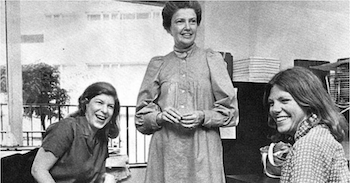
Stamberg expanded her career by writing two books, co-editing another, and collaborating on a chapter book. Her first book, released in 1982, was called Every Night at Five: Susan Stamberg’s All Things Considered. Her second body of work discusses her two decades in NPR, named Talk: NPR’s Susan Stamberg Considers All Things, published in 1993. Her creative process took some acclimation with the writing medium since she was not used to writing long sentences and enjoyed using sophisticated words. These books delved deeply into Stamberg’s broadcasting career.
The novel The Wedding Cake in the Middle of the Road, written by W. W. Norton in 1992, was co-edited by Stamberg. She also wrote a chapter in a book titled What My Mother Gave Me: Thirty-One Women on the Gifts that Matter Most, which was a tribute to her mother. The concept of this novel was that a group of individuals would all receive a chapter in the book to discuss how their mother provided for them in their lives.
Stamberg has also dipped her toes into the world of public television. For instance, she worked with Fred Rogers and hosted and recorded television specials with him on Mr. Rogers Neighborhood. These specials were for parents of children, a sort of question and answer session. Stamberg also narrated presentations by the St. Louis Symphony Orchestra and National Symphony Orchestra. Stamberg also had a Broadway role in An American Daughter, which used only her voice.
On October 9th, 2007, Stamberg’s husband died. Louis had encouraged Stamberg to take leaps in her career, and not having him around took some acclimation. They had been together throughout their professional journey, supporting each other along the way. Thus, his death played a big role in Stamberg’s decision to work into her eighties. She has said that she will never retire because NPR keeps structure in Stamberg’s life and gives her a focus through writing and reporting. Currently, Stamberg reports on cultural issues for Morning Edition and Weekend Edition Saturday.
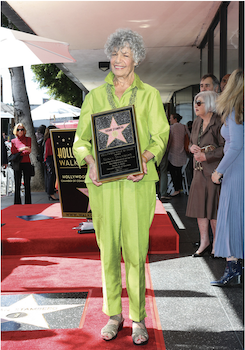
Stamberg is considered a “founding mother” of NPR, along with Nina Totenberg, Linda Wertheimer, and Cokie Roberts. These women shaped NPR’s image and mission, and their impacts are still felt today. These women, including Stamberg, became role models for women in journalism. Up until they stepped in, men were dominating this field. Thus, Stamberg helped pave the way for women in the field of broadcast journalism, making them feel confident in their abilities. Stamberg devoted herself to a section of the NPR mission statement to “celebrate life.” This means that Stamberg wanted to find the morsel of good within what she is covering while also taking the space to acknowledge the bad because life is a mixture of both.
Stamberg has won many awards for her contributions to the field of broadcast journalism. She was inducted into the Broadcasting Hall of Fame in 1994 and Radio Hall of Fame in 1996. She also received a star on the Hollywood Walk of Fame in 2020. Moreover, she received the Armstrong and duPont Awards, the Edward R. Murrow Award from the Corporation for Public Broadcasting, the Broadcaster Award from the American Women in Radio Television, and the Ohio State University's Golden Anniversary Director's Award.
All of these decorations speak to Stamberg’s impact and legacy. Her passion for the art of journalism has fueled her success. Stamberg advises new journalists to “run full speed” and to clarify what journalism means to them before beginning their careers. She believes that the lines between self-expression and objective reporting have become blurred in recent years, and each path leads to very different outcomes. Therefore, Stamberg wants it to be clear that good journalists are not focusing their work on themselves and their opinions; they are about the facts.
Stamberg can be viewed as a role model for all women looking to make names for themselves in the field of journalism because she was one of the first women to dominate in a journalism setting. Stamberg created her very own broadcasting style that defines NPR. Her story helps us believe that we are all capable of what we wish to do, and her perseverance highlights the idea that women do not have to conform to the ways of men in order to be successful.
Why Did I Choose to Research Susan Stamberg?
I chose to research Stamberg because I not only identify with her career, but I look up to her character. I find Stamberg’s honesty and standard for quality journalism to be commendable and a way of reporting that all journalists should hold themselves to. As an avid NPR listener myself, I wanted to research the network on a deeper level. Thus, I wanted to unearth the roots of the podcast that I listened to most mornings or on car rides. Unsurprisingly, many women were behind the creation of NPR’s success. Stamberg’s story, along with the other “founding mothers” of NPR, is one that is not often told. Stamberg helped jump-start the NPR network, and her contributions have helped it flourish into the present day. It is certain that NPR would not be the same without her work over the years. Additionally, she provided an identity for women in journalism, especially broadcast journalism. Before her, there was a lack of respect for women’s voices on the radio. Therefore, she became a role model for women, giving them confidence to use their voice, a concept I find truly inspiring.
Works Cited
About “All Things Considered.” (n.d.). NPR.org. https://www.npr.org/templates/story/story.php?storyId=5002
Adams, N. (2021, May 4). Considering The History Of NPR’s All Things Considered. WYSO; WYSO. https://www.wyso.org/local-and-statewide-news/2021-05-04/considering-the-history-of-nprs-all-things-considered
Amazon.com. (2014). Amazon.com. https://www.amazon.com/Talk-susan-stamberg-considers-things/dp/0399518738
Chatting With One Of NPR’s “Founding Mothers” Susan Stamberg. (2020, February 26). LAist. https://laist.com/shows/airtalk/chatting-with-one-of-nprs-founding-mothers-susan-stamberg
Gross, T. (2021, April 28). “It Was Just Thrilling”: 2 NPR Founders Remember The First Days, 50 Years Ago. NPR; Fresh Air. https://www.npr.org/2021/04/28/991268881/it-was-just-thrilling-2-npr-founders-remember-the-first-days-50-years-ago
How Linda Wertheimer and Susan Stamberg Found Their Voices at NPR. (2021, April 15). Literary Hub. https://lithub.com/how-linda-wertheimer-and-susan-stamberg-found-their-voices-at-npr/
Huver, S. (2020, March 3). NPR’s Susan Stamberg Reflects on the Road to Hollywood’s Walk of Fame. Variety; Variety. https://variety.com/2020/tv/features/susan-stamberg-walk-of-fame-interview-1203519737/
Rachel Lewis Hilburn. (2023, June 6). CoastLine: NPR Founding Mother Susan Stamberg on the changing rules of journalism, understanding modern art, and Mama Stamberg’s cranberry relish. WHQR; WHQR. https://www.whqr.org/show/coastline/2023-06-06/coastline-npr-founding-mother-susan-stamberg-on-the-changing-rules-of-journalism-understanding-modern-art-and-mama-stambergs-cranberry-relish
Susan Stamberg. (2004, December 29). NPR. https://www.npr.org/people/2101242/susan-stamberg
Susan Stamberg | Jewish Women’s Archive. (2021, June 24). Jewish Women’s Archive. https://jwa.org/encyclopedia/article/stamberg-susan
Susan Stamberg ’59 Gets Her Star. (2024). Barnard Magazine. https://barnard.edu/magazine/spring-2020/susan-stamberg-59-gets-her-star
The Inauspicious Start To Susan Stamberg’s Broadcasting Career. (2015, April 18). NPR. https://www.npr.org/2015/04/18/400466804/the-inauspicious-start-to-susan-stambergs-broadcasting-career
Wikipedia Contributors. (2024, March 8). Susan Stamberg. Wikipedia; Wikimedia Foundation. https://en.wikipedia.org/wiki/Susan_Stamberg
This article was published on 10/19/24